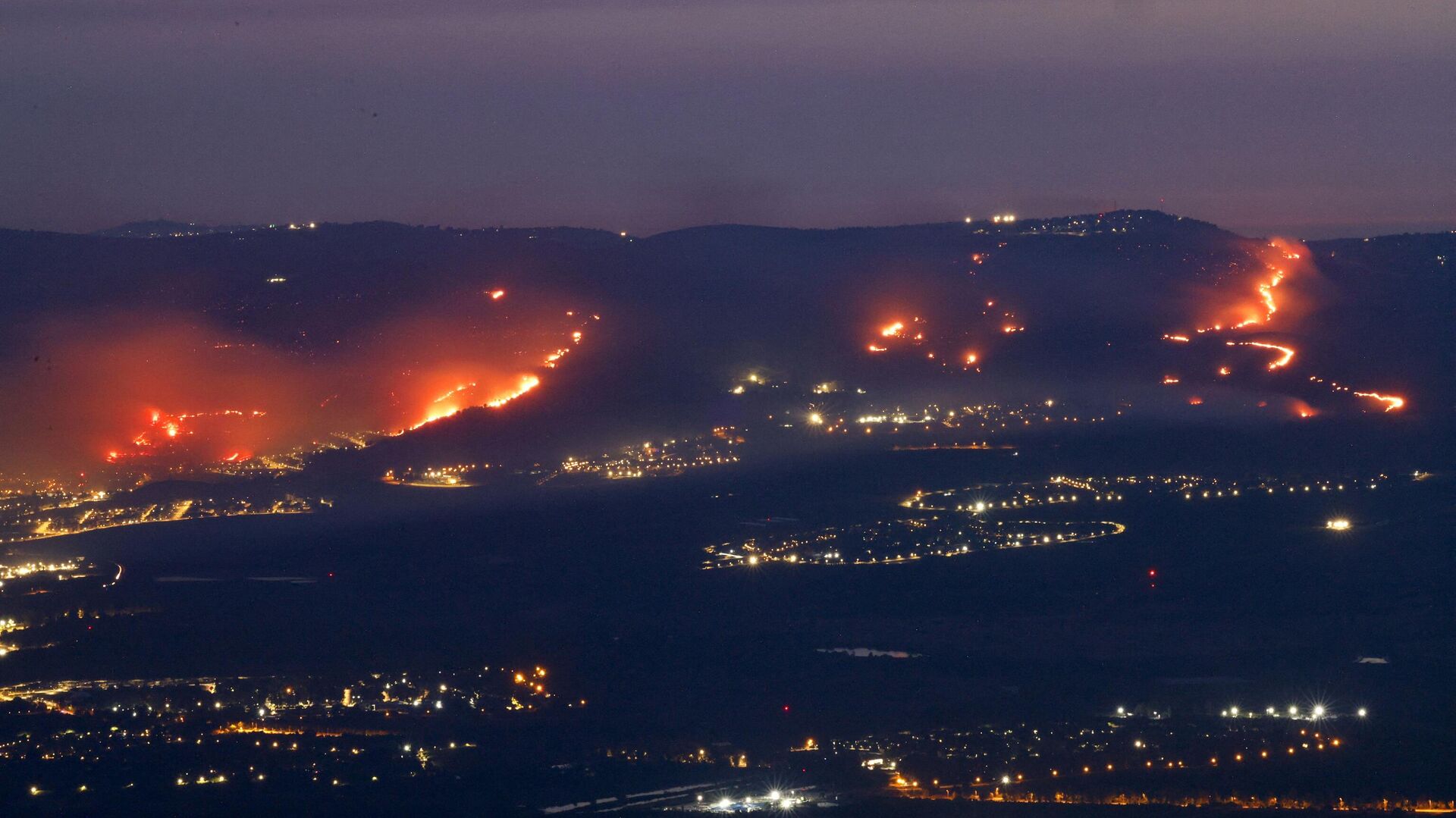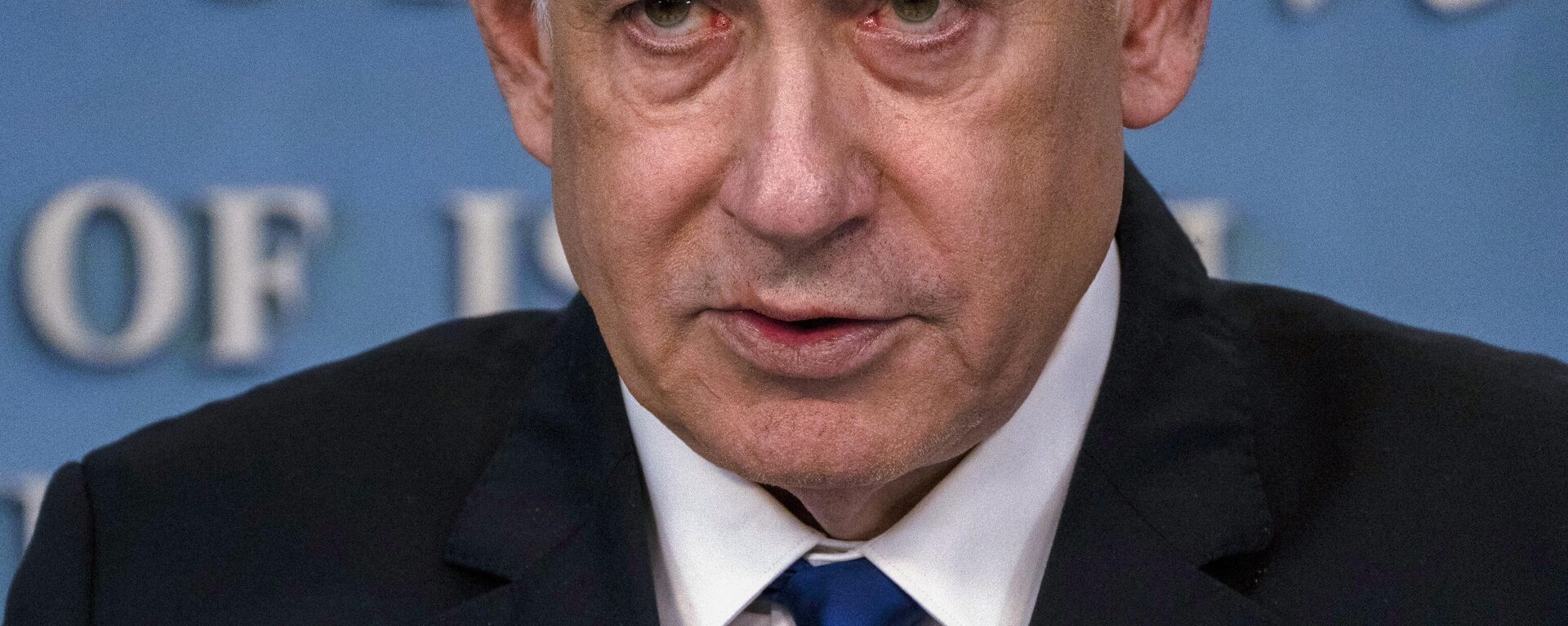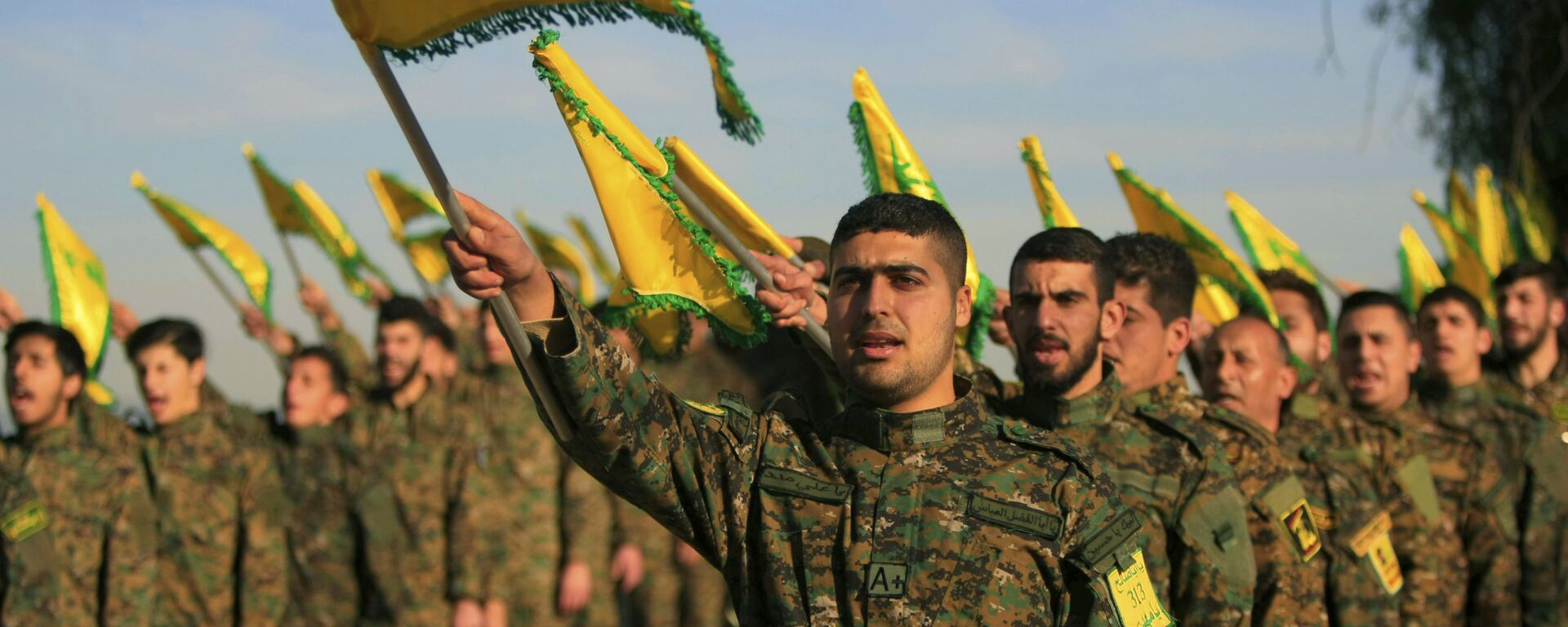https://sputnikglobe.com/20240609/gaza-to-look-like-playground-compared-to-lebanon-if-israel-hezbollah-standoff-spirals-1118881563.html
Gaza to 'Look Like Playground Compared to Lebanon' If Israel-Hezbollah Standoff Spirals
Gaza to 'Look Like Playground Compared to Lebanon' If Israel-Hezbollah Standoff Spirals
Sputnik International
Gaza will “look like a playground compared to Lebanon” if the current Israel-Lebanon tensions were to spiral out of control, pundits told Sputnik.
2024-06-09T12:20+0000
2024-06-09T12:20+0000
2024-06-09T12:20+0000
analysis
israel
benjamin netanyahu
lebanon
hezbollah
hamas
middle east
gaza strip
palestine-israel conflict
palestine
https://cdn1.img.sputnikglobe.com/img/07e8/06/09/1118881647_0:161:3071:1888_1920x0_80_0_0_0d0aa354a1dac00f2eae472744491603.jpg
If current Israel-Lebanon tensions were to spiral out of control, this could “impose a heavy toll on both countries in this conflict,” Joseph Helou, assistant professor of political science and international affairs at the Department of Social and Education Sciences at the Lebanese American University, told Sputnik.From the outset of the Arab-Israeli conflict in 1948, the entire Middle East has been, to varying degrees, a powder keg fraught with continuous rounds of conflict, he noted, adding that now the Israeli prime minister “seems to be making aggressive moves to render future conflicts very costly in terms of human lives and material losses.”Looking at the dynamics of the escalation, he recalled that after the Palestinian-Israeli conflict spiraled in the wake of the attack by Hamas in October last year, there was only limited military border skirmishes between Hezbollah and Israel. Hezbollah claimed it was its way of offering a “supportive front for Gaza,” claiming that the group would end the combat once the war on Gaza is terminated. Once Israel struck the Iranian Consulate in Damascus, Syria, on April 1, and intensified attacks on villages in southern Lebanon, Hezbollah beefed up its own drone attacks. Recent developments have shown that Hezbollah possesses advanced techniques to command operations via Iran-made drones, the scholar said, and recalled that “Hezbollah officials have publicly stated that only part of their military panoply has been used” so far.Stopping short of speculating on the sort of operations that Israel would be capable of carrying out in the northern regions of the country and in southern areas of Lebanon, the professor stressed:“Increased capabilities on both sides of the conflict places the situation on high alert, rendering any real impact assessment of military operations very tentative.” He noted that Hezbollah has “bypassed and even destroyed Israeli defenses on several occasions.”“This qualitative improvement has shifted the type of operations in the conflict, rendering the next episode of this ongoing war very hard to anticipate,” Joseph Helou said. According to him, this requires the international community to intervene to avoid further dangerous escalation. Prolonged peace is only possible if a two-state solution becomes reality, Helou emphasized.An independent Palestinian state, negotiated with “a wide array of international support, could help bring about some semblance of order in a chaotic Middle East,” he added. There is also a need to engage Iran in international diplomatic efforts towards a peaceful outcome, the expert said, as Tehran “possesses stakes in the conflict through their support of Hezbollah and other regional proxies.”Gaza will “look like a playground compared to Lebanon” if the current escalation "results in Iran trying to help Hezbollah and Lebanon,” Dr. Shaul Bartal, a retired lieutenant colonel and researcher at Israel's Bar-Ilan University’s Begin-Sadat Center for Strategic Studies, told Sputnik.He noted that a further regional war may “end in the destruction of entire regions in Israel, but also in colossal destruction in Lebanon and Iran.”Currently, Israel's goal in the standoff with Hezbollah is to remove the Lebanese Shiite movement from the border "as far as beyond the Litani River, and even beyond a range of 10-15 km,” Dr. Bartal remarked. If there is a political agreement with the Lebanese government according to which only its army is allowed to operate in southern Lebanon and Hezbollah is removed from the border, then “the war in the north will end,” he noted.However, failing that, in a further tit-for-tat, Hezbollah “could use the 150,000 missiles it has against Israel,” while Tel Aviv, in turn, would wreak “enormous destruction” upon Lebanon.
https://sputnikglobe.com/20240605/israel-ready-to-take-decisive-actions-against-hezbollah---netanyahu-1118784934.html
https://sputnikglobe.com/20240608/israel-cant-win-all-out-war-against-lebanons-hezbollah-heres-why-1118878260.html
israel
lebanon
gaza strip
palestine
Sputnik International
feedback@sputniknews.com
+74956456601
MIA „Rossiya Segodnya“
2024
News
en_EN
Sputnik International
feedback@sputniknews.com
+74956456601
MIA „Rossiya Segodnya“
Sputnik International
feedback@sputniknews.com
+74956456601
MIA „Rossiya Segodnya“
israel-lebanon tensions, israel and lebanon inch towards war, can israel beat hezbollah, who is stronger israel or hezbollah, can israel crush hezbollah, israel war in lebanon, hezbollah hits idf,
israel-lebanon tensions, israel and lebanon inch towards war, can israel beat hezbollah, who is stronger israel or hezbollah, can israel crush hezbollah, israel war in lebanon, hezbollah hits idf,
Gaza to 'Look Like Playground Compared to Lebanon' If Israel-Hezbollah Standoff Spirals
Amid Israel’s ongoing war on Hamas, Prime Minister Benjamin Netanyahu has been threatening to expand the Gaza conflict into Lebanon against Hezbollah.
If current
Israel-Lebanon tensions were to spiral out of control, this could “
impose a heavy toll on both countries in this conflict,”
Joseph Helou, assistant professor of political science and international affairs at the Department of Social and Education Sciences at the Lebanese American University, told
Sputnik.
From the outset of the Arab-Israeli conflict in 1948, the entire Middle East has been, to varying degrees, a powder keg fraught with continuous rounds of conflict, he noted, adding that now the Israeli prime minister “seems to be making aggressive moves to render future conflicts very costly in terms of human lives and material losses.”
Israel is “prepared for an extremely powerful action in the north” against Hezbollah, Prime Minister Benjamin Netanyahu warned on June 5, amid an escalation of cross-border skirmishes, which have included Hezbollah drone attacks inside Israel and the shootdown of a heavy Israeli drone over Lebanese airspace. Netanyahu spoke in the northern city of Kiryat Shmona, which has been evacuating civilians amid the fighting. The PM vowed to "bring back security," as he referenced the Axis of Resistance, which includes Hezbollah in Lebanon, Syria, Iraqi Shia militias, and Yemen’s Houthis.
Looking at the dynamics of the escalation, he recalled that after the Palestinian-Israeli conflict spiraled in the wake of the
attack by Hamas in October last year, there was only limited military border skirmishes between Hezbollah and Israel. Hezbollah claimed it was its way of offering a “
supportive front for Gaza,” claiming that the group would end the combat once the war on Gaza is terminated.
Once
Israel struck the Iranian Consulate in Damascus, Syria, on April 1, and intensified attacks on villages in southern Lebanon, Hezbollah beefed up its own drone attacks. Recent developments have shown that Hezbollah possesses advanced techniques to command operations via Iran-made drones, the scholar said, and recalled that “
Hezbollah officials have publicly stated that only part of their military panoply has been used” so far.
“Hezbollah has developed enormous capabilities in terms of techniques and military strategies, not only weaponry, which makes a conflict between two strong actors quite destructive,” the pundit remarked.
Stopping short of speculating on the sort of operations that Israel would be capable of carrying out in the northern regions of the country and in southern areas of Lebanon, the professor stressed:
“Increased capabilities on both sides of the conflict places the situation on high alert, rendering any real impact assessment of military operations very tentative.” He noted that Hezbollah has “bypassed and even destroyed Israeli defenses on several occasions.”
“This qualitative improvement has shifted the type of operations in the conflict, rendering the next episode of this ongoing war very hard to anticipate,” Joseph Helou said. According to him, this requires the international community to intervene to avoid further dangerous escalation. Prolonged peace is only possible if a two-state solution becomes reality, Helou emphasized.
An independent Palestinian state, negotiated with “
a wide array of international support, could help bring about some semblance of order in a chaotic Middle East,” he added. There is also a need
to engage Iran in international diplomatic efforts towards a peaceful outcome, the expert said, as Tehran “
possesses stakes in the conflict through their support of Hezbollah and other regional proxies.”
“This international political sponsorship for the resolution of the conflict does not currently dominate the political horizon. It has yet to be achieved. But without such backing, the Middle East is unlikely to witness an end to the Arab-Israeli conflict,” Joseph Helou noted.
Gaza will “look like a playground compared to Lebanon” if the current escalation "results in Iran trying to help Hezbollah and Lebanon,” Dr. Shaul Bartal, a retired lieutenant colonel and researcher at Israel's Bar-Ilan University’s Begin-Sadat Center for Strategic Studies, told Sputnik.
He noted that a further regional war may “end in the destruction of entire regions in Israel, but also in colossal destruction in Lebanon and Iran.”
Currently, Israel's goal in the standoff with Hezbollah is to remove the
Lebanese Shiite movement from the border "
as far as beyond the Litani River, and even beyond a range of 10-15 km,” Dr. Bartal remarked. If there is a political agreement with the Lebanese government according to which only its army is allowed to operate in southern Lebanon and Hezbollah is removed from the border, then “
the war in the north will end,” he noted.
However, failing that, in a further tit-for-tat, Hezbollah “could use the 150,000 missiles it has against Israel,” while Tel Aviv, in turn, would wreak “enormous destruction” upon Lebanon.
“The only solution to the current crisis is a political agreement between Israel and the Lebanese government that keeps Hezbollah away from the border. An agreement whose principles are already known and accepted by the parties, but Hezbollah insists on not signing it as long as the war in Gaza continues,” Dr. Bartal summed up.




